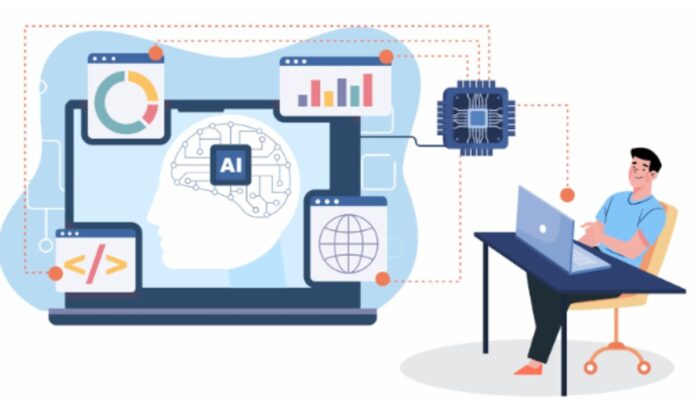AI Testing uses Artificial Intelligence (AI) tools and technologies. These tools automate and optimize the process of quality assurance. It improves the QA for businesses. AI-driven solutions test case generation. It helps in defect prediction and performance evaluation.
AI for QA offers solutions that increase scalability and accuracy. These Artificial Intelligence testing service predictive capabilities in testing cycles. It helps in increasing business growth and innovation.
But how does this help in your business? AI testing can improve speed and accuracy. It leads to increased efficiency of your QA processes. It reduces human error and delivers better software in less time.
This blog will show the ways AI testing can transform QA for your businesses. It will also explain challenges businesses face while including AI automation testing. Read further to understand the steps to overcome the challenges.
Enhancing test accuracy and coverage with AI testing
AI testing ensures higher accuracy in testing. It can do an evaluation of large datasets quickly. AI tools also improve test coverage by identifying hidden issues. Artificial Intelligence testing services can lead to better software quality and fewer bugs in production.
Challenges in implementing AI for test accuracy
- Lack of skilled professionals for AI automation testing.
- Compatibility issues between AI tools and older systems.
- High initial investment to adopt AI for QA testing solutions.
Steps to overcome these challenges
- Train your QA team in AI-based testing tools.
- Use middleware to connect AI tools with legacy systems.
- Start with affordable AI tools and scale up gradually.
Accelerating QA processes through AI automation testing
AI automation testing makes QA faster and more efficient. AI for QA solutions automates repetitive tasks and reduces manual effort. Businesses can release software faster without compromising quality. Artificial Intelligence testing services can help in the process
Challenges in accelerating QA with AI
- Resistance from teams used to manual testing.
- Difficulty choosing the right AI tools.
- Concerns about data security in AI testing environments.
Steps to overcome these challenges
- Organize training sessions to introduce AI automation testing.
- Research and select AI for QE tools that meet your business needs.
- Implement strict security protocols for handling sensitive data.
Predictive analysis to prevent defects
It is one of AI’s most powerful features. It uses historical data to find patterns. This helps predict and prevent defects before they happen.
Challenges in implementing predictive analysis
- Insufficient historical data to train AI models.
- Complex algorithms that require expert knowledge and experience.
- Need for continuous updates to AI models.
Steps to overcome these challenges
- Start collecting and organizing QA data for AI models.
- Work with AI for QE experts to handle complex algorithms.
- Schedule regular updates to improve AI performance.
Enhancing regression testing efficiency with AI automation testing
Regression testing helps you with the new updates. It ensures that these updates don’t break existing features. AI automation testing speeds up regression testing. Artificial Intelligence testing service identifies affected areas quickly. This saves time and reduces costs.
Challenges in enhancing regression testing efficiency
- High effort is required to set up test cases.
- False positives can slow down the testing process.
- Managing a large amount of test data effectively.
Steps to overcome these challenges
- Use AI to prioritize test cases based on their impact.
- Validate test results to minimize false positives.
- Implement tools to organize and manage test data.
Achieving scalability and flexibility with AI testing
AI testing allows businesses to scale their QA processes. AI for QA testing adapts to changing project requirements. It leads to consistent quality. This is particularly useful for growing businesses.
Challenges in achieving scalability and flexibility
- Difficulty integrating AI tools with existing workflows.
- Infrastructure limitations for scalable AI testing.
- Cost concerns when scaling AI solutions.
Steps to overcome these challenges
- Integrate AI for QE tools gradually to avoid disruption.
- Use cloud-based AI testing platforms for scalability.
- Plan your budget carefully to manage costs.
Driving cost efficiency with AI for QE
AI for QE reduces costs by automating repetitive tasks. It improves resource utilization and reduces time-to-market. Businesses can invest saved resources into other critical areas with AI for QE tools.
Challenges in driving cost efficiency
- High upfront costs for AI tools.
- Difficulty proving ROI to stakeholders.
- Reluctance to allocate budgets for new technology.
Steps to overcome these challenges
- Choose affordable AI automation testing tools.
- Use metrics to show ROI and justify costs.
- Implement AI testing in phases to spread costs over time.
Final thoughts
AI testing is bringing a transformation in the processes of Quality Assurance. It improves test accuracy and speeds up processes. It also helps in increasing cost efficiency. You can address the discussed challenges with Artificial Intelligence testing service experts. They will help you to implement the right strategies for AI automation testing. You will unlock the full potential of AI for QA.
Qualitest is an experienced industry leader in Artificial Intelligence testing services. Their AI for QA experts will integrate AI testing smoothly into your QA processes. Their expert knowledge in AI for QA process will help you to grow. Your business will achieve scalable, efficient, and reliable QA solutions.
Ready to explore how AI testing can transform your QA processes? Qualitest offers cutting-edge and custom AI solutions. Contact them today to learn more!




